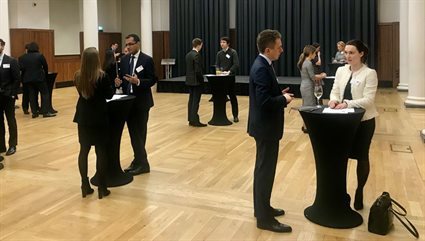14 February 2018
International Law Mentoring Programme launched at King's
Young Public International Law Group (YPILG) Mentoring Programme sees postgraduate students partnered with experts in the field of international law.

On 5 February, the inaugural Young Public International Law Group (YPILG) Mentoring Programme was launched in the Great Hall of King’s. The programme connects experienced individuals with newer members (with two to five years’ experience). Mentors are partners and senior associates at leading law firms, members of the Bar, specialist academics, Government legal advisers, and leaders in civil society.

The programme is being run on a pilot basis with 40 participants. The format was rapid-fire conversation (with a 10-minute limit) between each mentor and mentee, with two follow-up telephone calls during the next 12 months. YPILG hopes that this combination of focused conversations and defined time commitments will make this a fruitful experience for both mentor and mentee.
King’s postgraduate law students with the requisite work experience attended the launch event.
Niccolo Ridi (current King’s PhD candidate) said, ‘I believe the formula worked very well, as it provided an opportunity to have a serious conversation with accomplished (and busy!) practitioners and the perfect setting in which to do so. I feel much more confident about the next steps in my career’.
Neza Hren (King’s LLB with European Legal Studies, graduated 2013) observed, 'It was a great opportunity for young lawyers like myself to meet inspiring mentors and receive important advice from some of the most experienced and successful individuals in the field of international law. I also appreciated the chance to meet other young lawyers taking part in the mentorship programme and exchange ideas and tips with them'.
The Dickson Poon School of Law is an academic partner of YPILG and Dr Philippa Webb is a YPILG Board Member. Dr Webb said 'public international law can be a hard field to break into, with no obvious guaranteed path to success. This makes mentoring and networking all the more important for advanced students and junior practitioners.'
